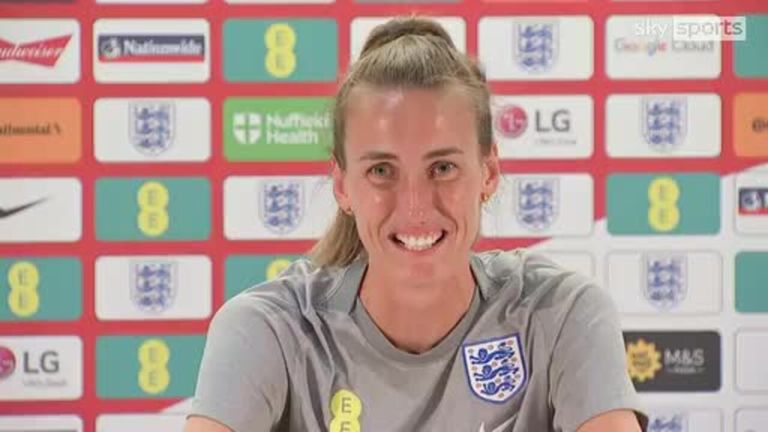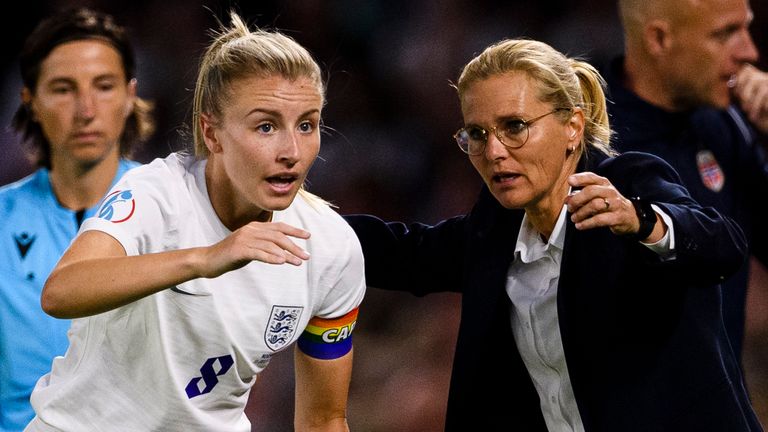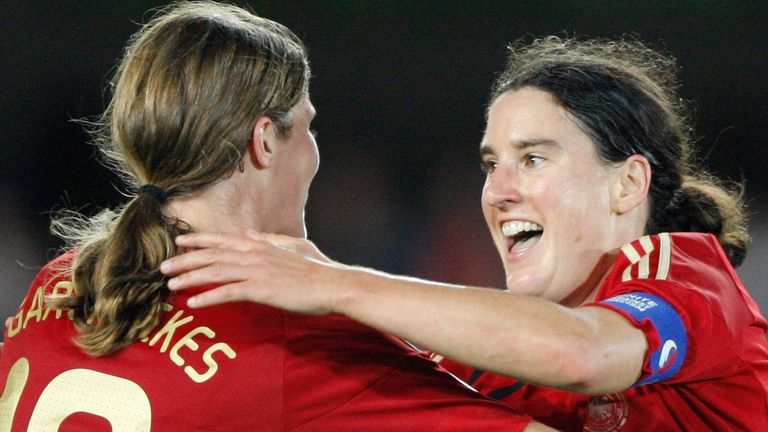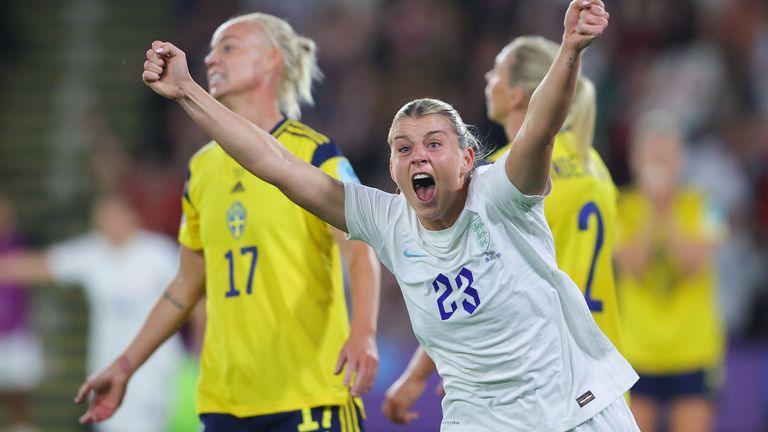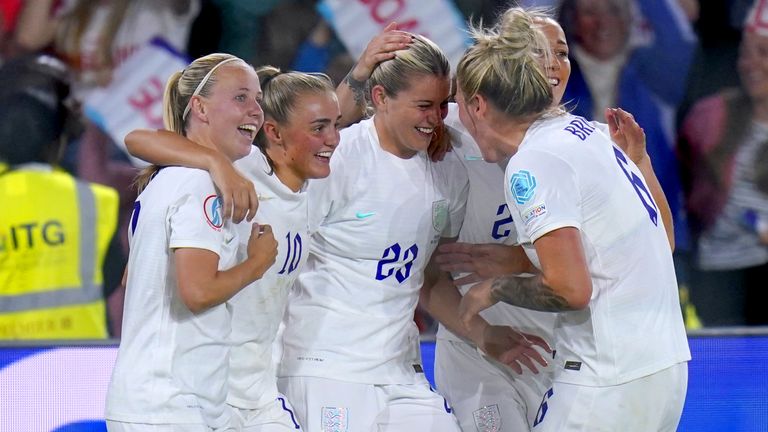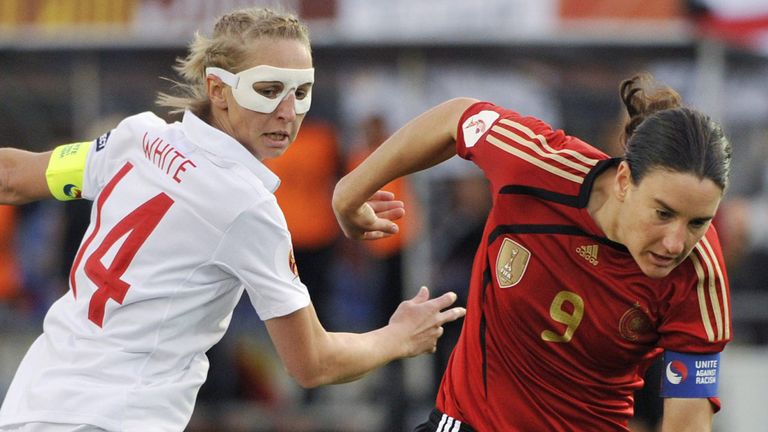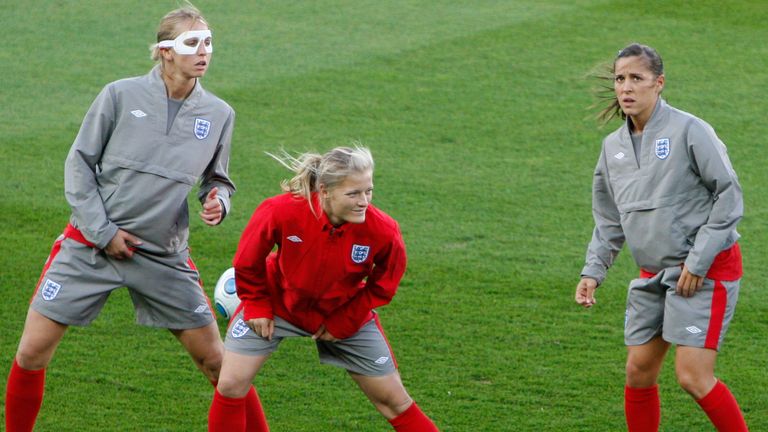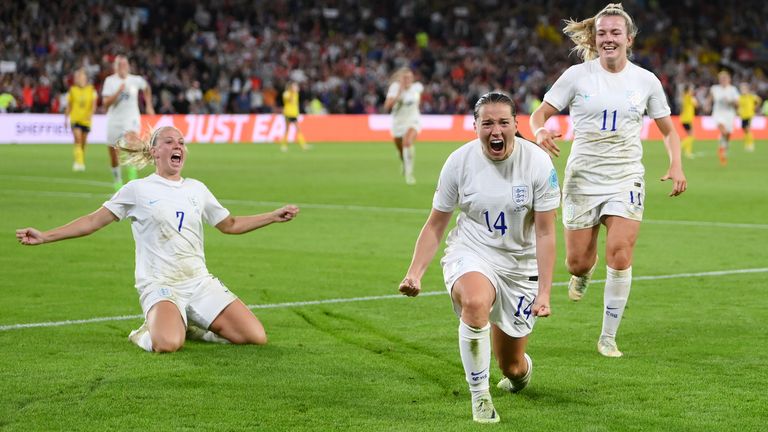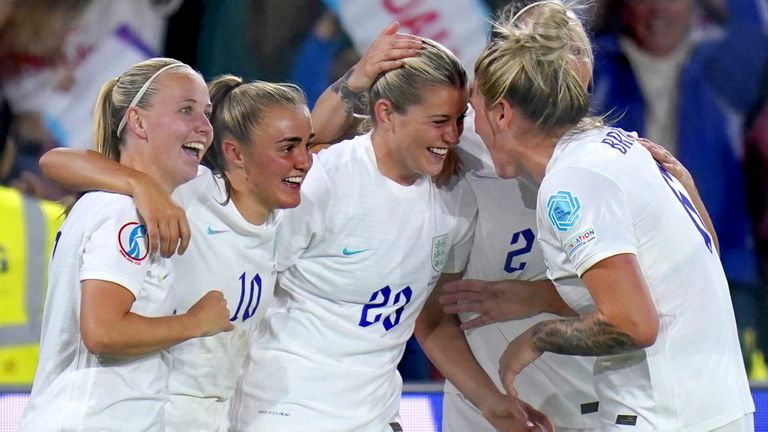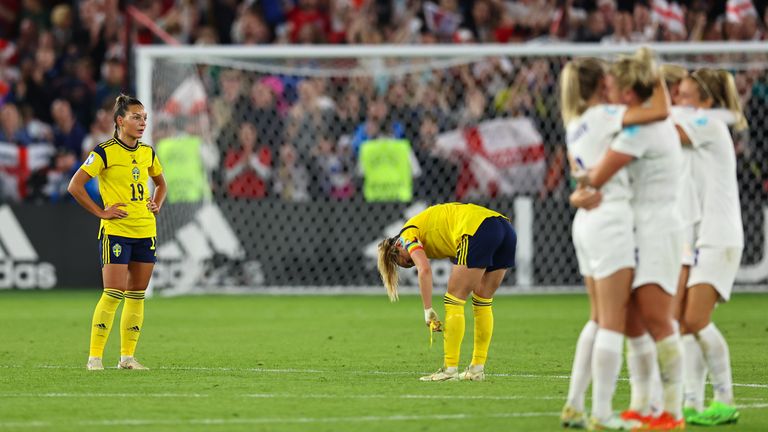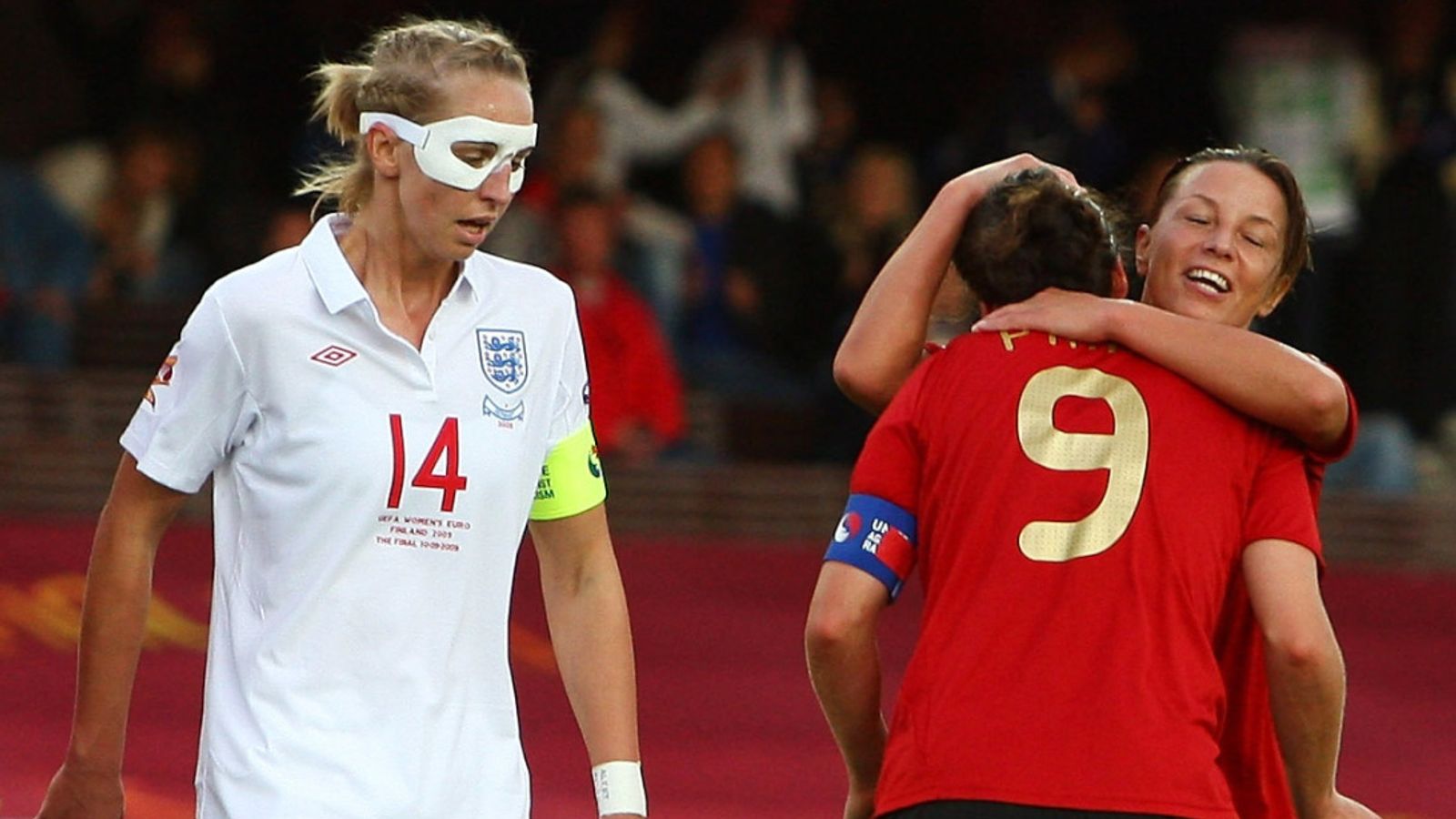
England’s showdown with Germany on Sunday is a well-trodden path – it will be a replay of the Euro 2009 final, in which Germany ran out as 6-2 winners.
The game came at a time of supreme dominance for the Germans in international women’s football. Their victory in Finland on September 10 saw them secure their seventh European Championships title, while the Lionesses featured in their second final.
Inside 22 minutes, Germany were already 2-0 ahead with goals from Birgit Prinz and then Melanie Behringer. England pulled a goal back through Karen Carney two minutes later, with Jill Scott also seeing an effort cleared off the line just before the break.
Kim Kulig restored Germany’s two-goal cushion five minutes after the break, with Kelly Smith producing a trademark finish to cut the deficit to 3-2. But in the final half an hour, Germany ran away with the game with Prinz adding her second, alongside a double from Inka Grings.
Now, the two old enemies will face each other again on Sunday in the Euro 2022 final, with perhaps a little bit of revenge on the cards, Here, goalscorer Carney, Sue Smith and then-England captain Faye White give their memories of that day…
‘Unique Germany nothing like I’d faced before’
Sky Sports’ WSL pundit Karen Carney:
“I remember the Germans had a win bonus and we were laughing because we were like ‘wow, that’s incredible’ and those were the kinds of differences we were up against. Maybe four of us were full-time in America, but only for around six or so months. The rest of the team were working and I don’t think central contracts had come into play so everyone was working and training.
“So there were a lot of differences between Germany and England, but I felt we had a good team cohesion. We were in the game up until half-time, and then in the second half they pulled away with the resources and the technical ability, that’s what really set them apart.
“The goal [Carney scored] was really created by Kelly [Smith], and I was just there to tap it in. I actually thought my assist for Kelly’s goal was a lot better. We had a really good relationship in terms of finding each other and finding spaces.
“For me, I was in the best shape of my life at the time, but we were still physically up against it. They were so much stronger and faster than us, but we were in it for large parts of the game. It then crumbled away and that was the reality, but it was where we wanted to be.
“From Euro 2005, finishing bottom of the group, to the 2007 World Cup where we reached the quarter-final and then the final in 2009, we thought we were on a really good trajectory and that was our path.
“I remember the German coach and the American coach watching at the time said 6-2 didn’t really reflect it. We lost the game, but we still had a lot of opportunities and pushed a German team like no other team had done previously. A lot of people recognised that.
“They were just ruthless. They were clinical, powerful and nothing I’d ever come up against before – they were really unique. It was mad, actually.
“It’s not every day you’re in a European final, some fantastic players never get the privilege of doing that. When you don’t win things, it becomes a bit of blurred memory, you don’t really want to remember it.
“I don’t really know how I feel about it, if I’m honest. Even though I’ve got bronze and silver medals, I’ll always be sad I never managed to get the gold.
“I wish the team were professional and it was more even. I wish we could have given it a really good go, but it was probably never a fair battle. But that’s part of the journey we’ve gone from to where we’re at today.
“We needed to go to those places and experience those things. Four or five of us went to America and that made people want to give us central contracts. Then there was a professional league and that led to the best league in the world. That has then meant our team is in a great position to win a European Championship on Sunday.
“You can’t change things, I just wish we were all full-time and were given the best opportunity. But it didn’t happen and we gave it our best shot. Our families and the country were proud of us and I think that’s what I look back on more fondly. We did it together as a group and you always want to leave the place in a better spot. I think we have done because the game has moved forward in such a positive way.”
‘We prepared to beat Germany – but they were too strong’
Sky Sports News’ Sue Smith:
“Starting the tournament, there was little expectation for us to do anything. It was just what we were putting on ourselves. We started against Italy and I remember straight away, we got beaten, Casey Stoney got sent off, I ended up playing left wing-back where I’d never played before and we lost.
“I was thinking ‘oh great, we’re going to go out at the group stage here’, but we managed to get out of the group. Not doing so well also meant we had an easier route to the final. We got better and better, but Germany were such a force.
“We’d never beaten them before and we had a psychologist that was with us for quite a while. She was doing specific things on getting your mindset right, playing against a Germany side who we’d never beaten before and different ways of thinking.
“I played in every game and got dropped for the final. Jill Scott came in, I think they wanted a little bit more physicality. But I was sitting watching it and as soon as we conceded, you could see the players just went. You think you’ve got belief, you do all these psychology sessions and getting the mindset right, doing all the preparation on how we’re going to beat them and you just had a feeling of ‘what are we going to do now?’
“That is the difference from then to now is that we were preparing to beat them, looking at their strengths and how good they are and how we were going to stop them. But now, we focus on our strengths and what we’re good at. That’s something Sarina has instilled into them.
“Of course, you have to look at the opponent and try and stop them, but it’s also about yourself and that belief and mindset that these players have, we didn’t actually have then and it’s probably because we hadn’t beaten the top teams. We were still growing and were probably over-reliant on Kelly Smith to do something, whereas now, there are so many players that can do something. They’ve got that strength in depth that we maybe didn’t have at the time.
“Even though we said we were confident going into the game, I don’t think we actually were. We heard just before the game that Germany had planned a winners’ party, all their friends and family were invited, so we wanted to spoil their party. We tried to use it as motivation but that was the confidence they had, we were just in their way.
“People are fearing England now, and we didn’t have that. We got through, but probably hadn’t faced any of the big teams on the run to the final. Germany just saw us as an opponent that they had beaten so many times previously, whereas now, this German side are looking at England as a team that needs to be respected. There is just as much of a fear factor for them as there is for us.
“We’ve always been a team that gives absolutely everything and fights until the end, we worked really hard. Technically, the majority were decent but Germany were on another level. Even though we fought back and scored a couple of goals, they thought ‘OK, we’ll just score more’ and that was the mentality they always had. They were just a better team all around.
“We did all our preparation and training, but we were semi-pros as well and I think they were all full-time pros so that had an impact. The quality and fitness levels that they had weren’t on that same level, a lot of our players were still trying to fit in work around training and playing.
“As soon as we finished, it was just disappointment and getting to the final was huge for us. At the start of the tournament, if they said you will get to the final and win a silver medal, we would have been happy, but once you’re there, you want to win.
“It’s afterwards when you start reflecting and you maybe see your friends and family and they say ‘wow, what an amazing achievement’. You then start realising that you were beaten by a very good side, who have won the Euros so many times and a team we’ve struggled to play against.
“Then it’s how can we be as good as them and start winning things. That building block has been happening, the FA have looked at how we can start winning trophies and investing more money. It was certainly a catalyst and you can look at different points of women’s football, but that made people go ‘OK, we do have the capability of getting to a final, now how can wrong one further?’.
“Now, you look back with pride that you actually got there. The difference again was there was no media coverage until the final. It was then that everyone got on board and realised we could win. Then the pressure and expectation was on a bit more, you knew there were so many millions of people watching at home and suddenly, there were lots of people coming over.
“We’re grateful that we got a silver medal but disappointed that it wasn’t gold because I’m the worst loser ever. It was horrible not actually winning, but it made us better and made us want to win more.”
‘Euro 2009 final the biggest game I played in’
Former England captain Faye White:
“There was excitement because we’d never got that far before and no one expected us to do it at the time either. The difference in the two teams was quite massive, they were going for their seventh title and had Inka Grings and Birgit Prinez, their goalkeeper Nadine Angerer was so dominant in the women’s game at that time.
“For us, it was our first final, but in the moment, it was ‘come on, we can do this, we’re in a final, we’ve got to give it everything’ and you believe it.
“We stuck with them for about 60 minutes, it was 3-2 at that point, and then they went from third in fifth gear and that’s their experience. You underestimate the nerves and even in the days leading up to it, how much it can drain out of you with the whole excitement of it. Equally, it was a different comparison as far as what they had experienced and how they handled the occasion compared to us.
“I remember things like going to the stadium the night before to train and you walk out, looking around and visualising how it’s going to be the next day. You just want a good training session to feel good about the next day as a group and you want to take it all in, but you have to be focused as well.
“Personally, I had a fractured cheekbone in the quarter-final so I went home and had an operation. I was then on the bench as an unused sub, but named on the squad sheet because I couldn’t play in the semi-final, but was fit enough for the final. I had a mask flown out to me which was made and I had to get used to wearing that as well for a couple of days leading into it so there was a lot going on.
“The media attention also increased suddenly. We knew the game was going to be shown on the telly even though none of the others had. Throughout the tournament, I remember Hope [Powell] saying ‘if you get out of the group, we’ve been told they’ll show it on the TV’, but they didn’t.
“Then they said ‘if you get to the semi, they will’ and they didn’t, but when we got to the final, they did show it. That was kind of a motivator in a way, because they had shown all of the 2007 World Cup games, but hadn’t in the Euros, I’m not sure why.
“That memory sticks out and it was a motivator because we knew major tournaments were our chance to get more exposure and to show the game in a good light. Getting to a final, we felt we deserved that at least.
“During the game, I thought we started well and we were sticking with them in a way, but it was [Melanie] Behringer, one of the central midfielders, who hit a strike from 35 yards out. Rachel Brown was in goal but no goalkeeper was saving it. We were doing well and then they go and do that. It’s typical of the Germans that they can score goals like that in the big occasions.
“Karen and Kelly [Smith] scored for us, and I just remember how good Kelly was with the ball at her feet. She was so tricky when she had the ball and she turned it back onto her left foot, put the centre-halves on their bums before putting it past the goalkeeper.
“At the time, we’d never scored two goals against them at a major tournament before. At the 2007 World Cup, we drew 0-0 with them and that was the first time we’d stopped them from scoring against us. It was also the first time in about a decade they had dropped points at a major tournament. For us, that was a massive achievement, but two years later in the final, they scored and we responded, yet they still had too much for us in the final 30 minutes.
“We want into half-time quite positive and saying we were still in the game, but they knew how to step it up and blew us away. There was probably a bit of fear because of how dominant they were. That’s the difference when they score, you can see the confidence drain out of teams – a bit like Sweden after England scored the second goal in the semi-final on Tuesday – and even though they want to, they can’t respond as well.
“It was emotional afterwards and we were a bit upset. You’re not happy that you lost but got to the final in that moment, it’s only afterwards and now later on when you put your career into perspective, that we’ve had good England teams that haven’t managed to do it until now.
“I look back and say it was the biggest game I ever played because it was in a major final and a lot of England players won’t ever experience that, in the men’s game too until last summer. Once the disappointment has faded, it was pride that we’d gone from a team that hadn’t qualified for a major tournament for a long time to then playing in a first World Cup in 2007 and getting to the final in 2009.
“Everyone that has gone before, you play a part in trying to leave the England team in a better place, not only on the field but also off the field and the exposure they get, raising the game and the profile. Not only with the fitness, ability and the way the game is viewed, but also by inspiring young girls to play and breaking down those barriers which, unfortunately over my career, was different to what the girls are experiencing now.”
Follow the Euro 2022 final across Sky Sports
Sky Sports News and Sky Sports’ digital platforms will be following every step of England’s Euro 2022 journey ahead of Sunday’s final.
The Sky Sports News Mobile Presentation bus will bring you all the best guests and analysis outside Wembley, with the likes of Karen Carney, Sue Smith, Courtney Sweetman-Kirk and Laura Bassett offering their expert insight.
Across SkySports.com, the Sky Sports App and on social media, we’ll have all the big moments covered with our previews, features, reports, analysis, plus the the Sky Sports Women’s Euros podcast with Sky Sports’ senior football journalist Charlotte Marsh and Sky Sports News reporter Anton Toloui.
And if you’re new to the England squad, don’t worry – here’s our guide to meeting the Lionesses.

